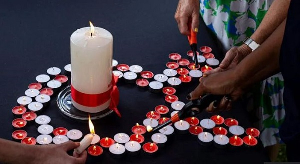The Member of Parliament (MP) for Builsa South in the Upper East Region, Dr. Clement Apaak, has demanded a report from the Minister of Lands and Natural Resources to furnish parliament with how many containers of Rosewood impounded, since the ban on the wood was effected.
Again, he is requesting for the origin of the rosewood, how government intends to dispose the impounded rosewood and whether or not the affected communities, will share in the proceeds.
Making a statement on the floor of the August House on the illegal felling and harvesting of rosewood and its attendant destruction of the environment in the Builsa South District, Apaak, urged for a thorough investigation by the Bureau of National Investigation (BNI) into the illegal logging of the pricey wood and the perpetrators brought to justice accordingly.
In addition, he said they should be made to plant and nurture trees to maturity in the affected areas as a compensatory measure.
“The District Police Command, be instructed to arrest anyone felling rosewood in the Builsa South District. Those apprehended should be prosecuted. The police should work in collaboration with the Assembly and the Forestry Commission to enforce the ban on rosewood logging”, he suggested.
Rosewood, is a fine grained timber used principally for the production of high-end expensive furniture for the elite across the world, especially in Asia (China). It is used for making chess pieces as well as parts of musical instruments. It is estimated that China alone imports close to 96percent of all rosewood lumber exported out of Ghana.
Even though, there is a ban on the felling, harvesting and exportation of rosewood in the country with the recent ministerial directive issued in February 2017, the illegal activity on rosewood, continues unabated due to lack of robust enforcement measures.
The first ban on rosewood was announced in 2012, this ban was followed by the confiscation of illegal rosewood by a task force set up to bring to halt the illegal harvesting and export. The second ban was announced in September 2013 to take effect in 2014, whiles a third ban was announced in July 2014.
But according to Dr. Apaak, in spite of the current ban the fourth in row, rosewood logging is on-going in communities in his Constituency namely, Fumbisi, Uwasi, Weisi, Doninga, Bachonsi, Kanjaga, Gbedembilisi, Yapala, and several other communities in the Builsa South District.
“Only a few days ago, the presiding member of the Builsa South District Assembly alerted me to the fact that efforts by the assembly to stop the illegal logging are not being complemented by the police or the forestry commission. In fact, Builsa South has no forestry officer”, Apaak fumed.
“Mr. Speaker, my checks, confirmed by the Presiding Member and several other constituents indicate that these illegal loggers and criminals have started using Togo and as an outlet to get the criminal booty to designated destinations”, he revealed. He pointed out that, the stolen logs are transported to Togo via Bawku for export, to circumvent the ban on export from Ghana.
Apaak lamented that, the impact these illegal logging activities on the already precarious ecological conditions and livelihoods, need no further illumination.
“But, if the practice is allowed to continue, we all, in the very near future, will come to grips with worsening climatic conditions, a declining agrarian economy, and serious migration of environmental refugees from the savanna to the south. Mr. Speaker, we can expect more Kayayee!” Apaak stated.
He said, as leaders and representatives of the people, they cannot afford to watch unconcerned and allow these illegal loggers to make huge financial profit at the expense of the poor masses whose daily livelihoods depend on a healthy environment.
“This callous, cruel and wicked environmental carnage is not only the result of utter ignorance but that of sheer greed for money and insensivity to and total disregard for fragile ecosystem of Builsa South”, he said.
He called for an end to the carnage on the environment saying “the widespread environmental destruction in Builsa South and other parts of the northern savannah woodland ecological zone must end”.
Recently, the Forestry Commission led by Kwadwo Owusu-Afrieyie alias “Sir John” said it was targeting the local processing of Rosewood for value addition and export purposes.
The Commission, said this new agenda is aimed at efficient regulation of the exploitation of Rosewood in accordance with agreements with the Convention on International Trade in Endangered Species (CITES).
It would also help in reducing the illegal harvesting and export of the wood. Addressing a press conference at the Corporate Offices of the Forestry Commission, the Deputy Chief Executive Officer of the Commission, John Allotey said the Commission will issue licenses to some local factories that have been identified to have the capacity to process rosewood.
“The Forestry Commission will regulate the exploitation of rosewood in accordance with agreement with CITES. Henceforth the commission will be tasked to ensure domestic processing of rosewood logs for value addition prior to export to overseas market”, he stated.
The Forestry Commission gave owners of some 361 impounded containers of rosewood a two-month ultimatum to clear the logs or risk forfeiting them. This is to decongest the ports and wood depots where they are being kept. The owners would, however, be made to pay penalties for flouting a ban on the harvesting and transportation of the wood which expired on
December 30, 2016.
This one-off CITES permit is in view of the fact that they had already paid all statutory fees to the Forestry Commission. “It is also after payment of these penalties that the Forestry Commission will grant clearance for CITES certificate to be issued to enable shipment of the existing seized stocks”, the Deputy CEO of the Commission continued.
The Forestry Commission also revoked all existing agreements for the removal of trees from the Bui Dam enclave. This is upon the expiration of all permits as at December 31 2016 in respect of harvesting, transportation and export of Rosewood. Some four companies that were given permits to remove trees within the enclave and fairway but have failed to settle their debts with the Bui Authorities will lose existing stock recorded in their names.
Until about a decade ago, Rosewood was not considered among the commonly traded Ghanaian timber species on the international markets. The acceptability of the Rosewood on the international market some five years ago, led to the granting of harvesting permits to a few timber merchants for export. In the last few years, the harvesting and export of Rosewood has gotten out of control forcing the Forestry Commission to develop new ways of dealing with the phenomenon.
General News of Wednesday, 12 July 2017
Source: theheraldghana.com













